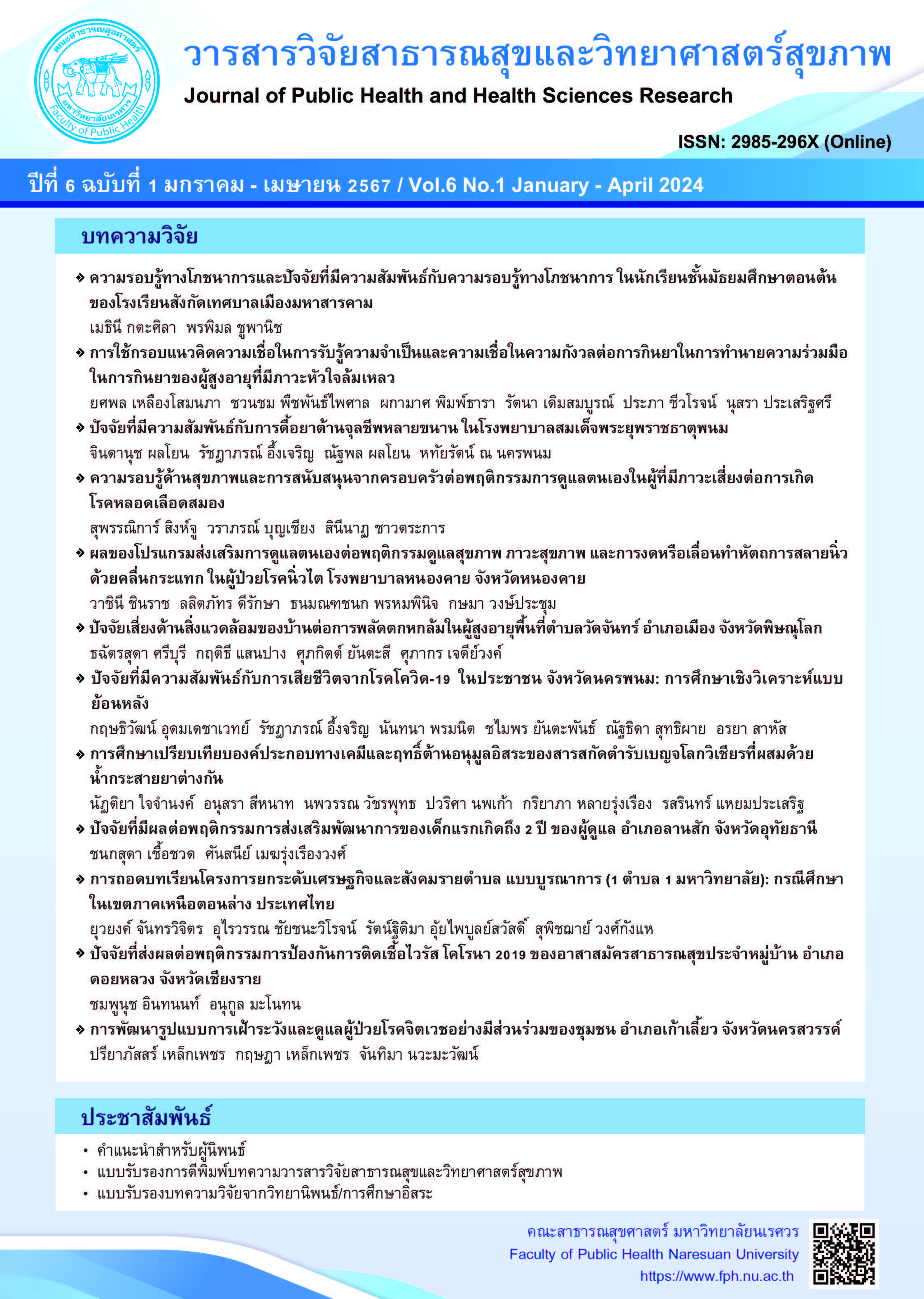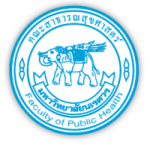ความรอบรู้ด้านสุขภาพและการสนับสนุนจากครอบครัวต่อพฤติกรรมการดูแล ตนเองในผู้ที่มีภาวะเสี่ยงต่อการเกิดโรคหลอดเลือดสมอง
คำสำคัญ:
การสนับสนุนจากครอบครัว, ความรอบรู้ด้านสุขภาพ, ผู้ที่มีภาวะเสี่ยงต่อการเกิดโรคหลอดเลือดสมอง, พฤติกรรมการดูแลตนเองบทคัดย่อ
การวิจัยแบบตัดขวางครั้งนี้ มีวัตถุประสงค์เพื่อศึกษาความสัมพันธ์ระหว่างความรอบรู้ด้านสุขภาพและการสนับสนุนจากครอบครัวต่อพฤติกรรมการดูแลตนเองของผู้ที่มีภาวะเสี่ยงต่อการเกิดโรคหลอดเลือดสมองกลุ่มตัวอย่างเป็นผู้ที่มีภาวะเสี่ยงต่อการเกิดโรคหลอดเลือดสมอง จำนวน 97 ราย อายุ 35-70 ปี และเข้ารับบริการในแผนกผู้ป่วยนอก โรงพยาบาลประสาทเชียงใหม่ คัดเลือกกลุ่มตัวอย่างโดยการสุ่มตามความสะดวก เก็บรวบรวมข้อมูลโดยใช้แบบสอบถามข้อมูลส่วนบุคคล ความรอบรู้ด้านสุขภาพ การสนับสนุนจากครอบครัว และพฤติกรรมการดูแลตนเองของผู้ที่มีภาวะเสี่ยงต่อการเกิดโรคหลอดเลือดสมอง วิเคราะห์ข้อมูลด้วยสถิติเชิงพรรณนาและสถิติสหสัมพันธ์แบบสเปียร์แมน
ผลการวิจัย พบว่า คะแนนความรอบรู้ด้านสุขภาพ (Mean = 27.90, S.D. = 5.90) คะแนนการสนับสนุนจากครอบครัว (Mean = 77.65, S.D. = 11.67) และคะแนนพฤติกรรมการดูแลตนเอง (Mean = 41.55, S.D. = 7.31) โดยรวมอยู่ในระดับสูง ความรอบรู้ด้านสุขภาพมีความสัมพันธ์ทางบวกกับพฤติกรรมการดูแลตนเองของผู้ที่มีภาวะเสี่ยงต่อการเกิดโรคหลอดเลือดสมองในระดับปานกลาง อย่างมีนัยสำคัญทางสถิติ (r = 0.41, p-value < 0.001) ส่วนการสนับสนุนจากครอบครัว ไม่มีความสัมพันธ์กับพฤติกรรมการดูแลตนเอง แสดงถึงว่า ความรอบรู้ด้านสุขภาพเป็นพื้นฐานที่สำคัญของพฤติกรรมดูแลตนเองในผู้ที่มีภาวะเสี่ยงต่อการเกิดโรคหลอดเลือดสมอง ดังนั้น บุคลากรทางสุขภาพจึงควรหาแนวทางในการส่งเสริมความรอบรู้ด้านสุขภาพในกลุ่มผู้ที่มีภาวะเสี่ยงต่อการเกิดโรคหลอดเลือดสมอง เพื่อให้สามารถดูแลตนเองได้อย่างเหมาะสมและเพื่อป้องกันการเกิดโรคหลอดเลือดสมองต่อไป
References
Chotchai, T., SeeDaket, S., Teaarak, K., Panyasong, S., & Buajun, A. (2020). Factors related to health literacy in prevention of hypertension among group at risk in Samran Sub-Districk, Muang District, Khon Kaen Province. The Southern College Network Journal of Nursing and Public Health,7(1), 45-56. (in Thai)
Cobb, S. (1976). Social support as a moderator of life stress. Psychosomatic Medicine, 38(5), 300-314.
Conner, M., & Norman, P. (2017). Health behaviour: Current issues and challenges. Psychology & Health, 32(8), 895-906.
Daemayu, A., Panuthai, S., & Junasopeepun, P. (2020). Correlation between health literacy and self-management among older Thai muslims with hypertension. Journal of Thailand Nursing and Midwifery Council, 35(3), 87-107. (in Thai)
Darun, P., & Khanpijan, N. (2016). Factors affecting health literacy and health behavior outcomes of working-age population in Porncharoen District, Bueng Kan Province. The Office of Disease Prevention and Control 9 Nakhon Rathasima Journal, 22(1), 14-24. (in Thai)
Department of Health Service Support. (2018, March 25). Assessment health literacy and health behavior. Retrieved June 24, 2023, from http://www.hed.go.th/linkHed/333 (in Thai)
Duangpratoom, N., & Rattanakanahutanon, F. (2019). Factors associated to self-care behaviors of type 2 diabetes mellitus patients in HuaiKhamin Health Promoting Hospital, Dan Chang, Suphanburi Province. Valaya Alongkorn Review Humanities and Social Sciene, 9(2), 53-67. (in Thai)
Feigin, V. L., Brainin, M., Norrving, B., Martins, S., Sacco, R. L., Hacke, W. et al. (2022). World Stroke Organization (WSO): Global stroke fact sheet 2022. International Journal of Stroke, 17(1), 18-29.
Fields, B., Lee, A., Piette, J. D., Trivedi, R., Mor, M. K., Obrosky, D. S. et al. (2021). Relationship between adult and family supporter health literacy levels and supporter roles in diabetes management. Families, Systems, & Health, 39(2), 224-233.
Gawulayo, S., Erasmus, C. J., & Rhoda, A. J. (2021). Family functioning and stroke: Family members' perspectives. African Journal Disability, 10(0), a801. https://doi.org/10.4102/ajod.v10i0.801
Ishikawa, H., & Kiuchi, T. (2019). Association of health literacy levels between family members. Frontiers in Public Health, 7, 169. https://doi.org/10.3389/fpubh.2019.00169
Jitapunkul, S., Kamolratanakul, P.,& Ebrahim, S. (1994). The meaning of activities of daily living in a Thai elderly population: Develop of a new index. Age Ageing, 23(2), 97-101.
Jodnok, K., & Panomai, N. (2019). Factors influencing stroke prevention self-care behavior at Buengkan Hospital, Buengkan District, Buengkan Province. North-Eastern Thai Journal of Neuroscience, 13(2), 38-55. (in Thai)
Kaewtong, N., Termsirikulchai, L., Leelaphan, P., Kengganpanich, T., & Keawdumkoeng, K. (2014). Health literacy of group at risk of hypertension at Ban Nonghoi Sub-District Health Promoting Hospital, Sa Kaeo Province. Journal of Boromarajonani College of Nursing, Bangkok, 30(1), 45-56. (in Thai)
Kareesun, K., Malathum, P., & Sutti, N. (2019). Relationships among health literacy, knowledge about hypertension control, and health behavior in older persons with hypertension. Ramathibodi Nursing Jounal, 25(3), 280-295. (in Thai)
Krainatee, M., Dhammasaccakarn, W., & Sungkharat, U. (2020). Family: The social key institutions and roles of holistic human development. Parichart Journal Thaksin University, 33(1), 1-16. (in Thai)
Kummmak, S. (2016). Self-care behaviors among hypertension patients in Nanglao Sub- District Health Promoting Hospital, Satingpha District, Songkhla Province. The Southern College Network Journal of Nursing and Public Health, 3(3), 153-169. (in Thai)
Liu, Y. B., Liu, L., Li, Y. F., & Chen, Y. L. (2015). Relationship between health literacy, health-related behaviors and health status: A survey of elderly chinese. International Journal of Environmental Research and Public Health, 12(8), 9714-9725.
Ministry of Public Health. (2017). 5-year national NCDs prevention and control strategic and action plan (2017-2021). Nonthaburi: Bureau of Non-Communicable Disease, Ministry of Public Health. (in Thai)
Ministry of Public Health. (2020). Public health statistics 2020. Nonthaburi: Ministry of Public Health. (in Thai)
Noppakraw, J., Chintanawat, R., & Khampolsiri, T. (2020). Health literacy andself-management in older persons with type 2 diabetes mellitus. Nursing Journal, 47(2), 251-261. (in Thai)
Nutbeam, D. (2000). Health literacy as a public health goal: A challenge for contemporary health education and communication strategies into the 21st century. Health Promotion International, 15(3), 259-267.
Orem, D. (1985). Nursing: Concepts of practice. New York: McGraw-Hill Book Co.
Pawan, V., Boonchuaythanasit, K., Ponrachom, C., & Sukopuk, M. (2017). Perception of information, knowledge and protecting behavior of diseases and health hazard of Thai citizens in 2016. Journal of Health Science Research, 11(1), 70-79. (in Thai)
Photihung, P. (2021). Relationship of health literacy to health promoting and disease prevention behaviors in Thailand: A systematic review. The Journal of Faculty of Nursing Burapha University, 29(3), 115-130. (in Thai)
Polit, D. F. & Beck, C. T. (2004). Nursing research: Principles and methods. (7th ed.). Philadelphia: Lippincott Williams & Wilkins.
Pongkumpa, L. & Himananto, S. (2017). Knowledge and self-care behavior among type 2 diabetes living in Bangsai, Maung, Chonburi Province. HCU Journal of Health Science, 20(40), 67-76. (in Thai)
Schaefer, C., Coyne, J. C., & Lazarus, R. S. (1981). The health-related functions of social support. Journal of Behavioral Medicine, 4(4), 381-406.
Silangirn, P. (2017). Factors related to self-care behaviors among elderly of Phayao Province. Thesis of Master of Public Health in Health Promotion Management, Thammasat University, Bangkok. (in Thai)
Sonsuk, J., & Khamwong, P. (2018). The influence of perceived severity, health literacy, and family support on self-care behavior to prevent knee osteoarthritis in elderly. Lanna Public Health Journal, 14(2), 36-45. (in Thai)
Srison, P., Hachauck, W., Ratchapakdee, P., & Uppasarn, W. (2019). Health literacy and self-care behavior among post valvular heart surgery patients. Journal of Nursing Association of Thailand Northern Region, 25(1), 1-13. (in Thai)
Srisuksai, N. (2013). Relationshiop between family function and perceived family support with diabetes mellitus in Banpong District, Ratchaburi Province. Nursing Journal of the Ministry of Public Health, 23(1), 60-69. (in Thai)
Suriya, J., Aungwattana, S., & Suankaew, S. (2020). Social support and health behavior of the elderly of club of Sungmen District, Phrae Province. Nursing Journal, 47(3), 267-276. (in Thai)
Tasuwanin, T., Manotham, M., Maneerat, W., Muangmool, J., & Phanwong, W. (2020). Self-care behaviors when illness and social support among Karieng elderly people at Ban Karieng Ruammit, Muang District, Chang Rai Province. Journal of Nursing and Health Care, 38(2), 158-167. (in Thai)
Tiamkao, s. (2019). Diabetes and stroke. Thai Journal of Neurology, 35(4), 59-71. (in Thai)
Trainattawan, W., Wirojratana, V., & Watanakukrailert, D. (2019). Factors influencing health literacy among older adults. Journal of Health Science Research, 13(2), 41-51. (in Thai)
Tubsee, S. (2020). Factors related to self-care behavior of the elderly in Kangkrajan District, Phetchaburi Province. Journal of Prachomklao Collage of Nursing Phetchaburi Province, 3(1), 14-30. (in Thai)
Wittink, H., & Oosterhaven, J. (2018). Patient education and health literacy. Musculoskeletal Science & Practice, 38, 120-127.
World Health Organization. (2022, June 1). Health literacy development for the prevention and control of noncommunicable diseases: Volume 3. Recommended actions. Retrieved June 24, 2023, from https://www.who.int/publications/i/item/9789240055377
Ritthichai, Y., & Pongsathonviboon, K. (2022). The effect of a perceived health beliefpromoting program combined with a mobile application on preventive behaviors in young adults at risk of stroke. Journal of The Police Nurses, 14(2), 254-267. (in Thai)
Zinat Motlagh, S. F., Chaman, R., Sadeghi, E., & Eslami, A. A. (2016). Self-care behaviors and related factors in hypertensive patients. Iranian Red Crescent Medical Journal, 18(6), e35805.doi:10.5812/ircmj.35805.
Downloads
เผยแพร่แล้ว
How to Cite
ฉบับ
บท
License
Copyright (c) 2024 วารสารวิจัยสาธารณสุขและวิทยาศาสตร์สุขภาพ

This work is licensed under a Creative Commons Attribution-NonCommercial-NoDerivatives 4.0 International License.
บทความที่ได้รับการตีพิมพ์เป็นลิขสิทธิ์ของวารสารวิจัยสาธารณสุขและวิทยาศาสตร์สุขภาพ
ข้อความที่ปรากฏในบทความแต่ละเรื่องบทความในวารสารวิชาการและวิจัยเล่มนี้เป็นความคิดเห็นส่วนตัวของผู้เขียนแต่ละท่านไม่เกี่ยวข้องกับมหาวิทยาลัยนเรศวร และคณาจารย์ท่านอื่นๆในมหาวิทยาลัยฯ ความรับผิดชอบเกี่ยวกับบทความแต่ละเรื่องผู้เขียนจะรับผิดชอบของตนเองแต่ละท่าน






